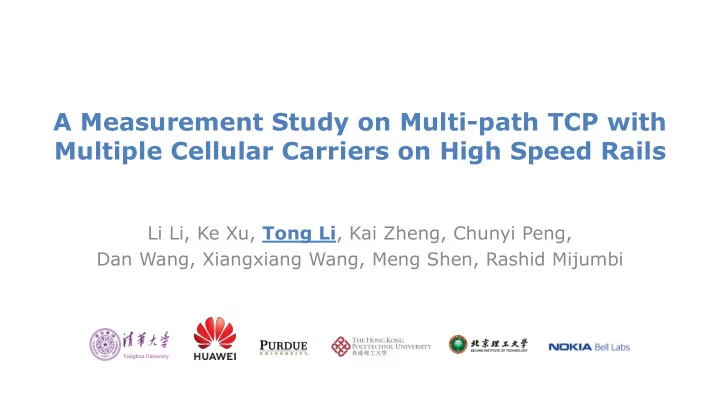

A Measurement Study on Multi-path TCP with Multiple Cellular Carriers on High Speed Rails Li Li, Ke Xu, Tong Li , Kai Zheng, Chunyi Peng, Dan Wang, Xiangxiang Wang, Meng Shen, Rashid Mijumbi
High Speed Rails (HSRs) 30,000 38,000 1.7 310 30% 66% km km billion km/h Length China Speed Passenger Growing 2020 Europe: Thalys Japan: Shinkansen China High speed mobility Increasing need for acceptable quality of network services 2
Single-Path Transmission on HSRs Frequent handoff is the main cause of performance degradation [Li, INFOCOM15] [Li, TON17] 3
Motivation of Using Multi-path Transmission Making use of the difference in handoff time between carriers Rarely happens at the same time An example of difference in handoff CDF of inter-carrier handoff interval time between two carriers To explore potential benefits of using Multi-path TCP (MPTCP) 4
Challenges • Many intertwined factors – External: terrain, speed, handoff and network type, etc. – Internal: flow size and algorithms (congestion controller or scheduler), etc. • Location and time bias – Same location vs high speed mobility – Same time vs flow interference • Effort and time intensive – Many people and much money – Massive data traces on various HSR routes 5
Measurement Methodology Measurement setup MobiNet Footprints USB cellular modems, USB WiFi modems Geographical location, train speed, Accumulated 82,266 km: accessing smartphone hotspots network type and handoffs 2x Earth Equatorial Circumference 6
Analysis Method Filtering data — terrain, speed, handoff and network type • Only consider data in 4G LTE networks in areas of open plains • Only consider two cases: static and high speed (280-310km/h) Comparison between MPTCP and TCP • Same flow size/duration, at the same train speed, with similar handoff frequency, in the same carrier network • Stable MPTCP kernel implementation v0.91: www.multipath-tcp.org Decision Making • Robustness: If MPTCP outperforms either of the two single TCPs • Efficiency: If MPTCP outperforms both single TCPs 7
Results Mice Flows 8
File Completion Time (FCT) M: Carrier M U: Carrier U TCP (M): single-path TCP using Carrier M TCP (U): single-path TCP using Carrier U MPTCP: dual-path MPTCP using Carrier M and FCT of mice flows (<1 MB) Carrier U, simultaneously 9
File Completion Time (FCT) M: Carrier M U: Carrier U Handoff path MPTCP Better path FCT of mice flows (<1 MB) Cannot achieve advantage over TCP in efficiency 10
File Completion Time (FCT) M: Carrier M U: Carrier U Large gap Small gap Handoff leads to efficiency reduction Inefficient sub-flow establishment to handoff FCT of mice flows (<1 MB) 11
Sub-flow Establishment Normal case: neither of two paths suffers a handoff Sub-flow 1 3 handshakes Sub-flow 2 3 handshakes 12
Sub-flow Establishment Handoff case: either path suffers a handoff Handoff path 3 handshakes 5 handshakes Handoff path 3 handshakes 5 handshakes Lucky Case Unlucky Case 13
Sub-flow Establishment Long tail 10% > 8 handshakes CDF of total number of handshakes CDF of Sub-flow establishment time MPTCP’s efficiency of sub-flow establishment is low in HSRs 14
Results Elephant Flows 15
Elephant Flows Metric: average rate during 100 seconds • Variable: train speed and number • of handoffs suffered 𝑁𝑄𝑈𝐷𝑄 𝑆 𝑞𝑝𝑝𝑠𝑓𝑠 = Robustness min(𝑈𝐷𝑄 𝑗 ) > 1 𝑁𝑄𝑈𝐷𝑄 Efficiency 𝑆 𝑐𝑓𝑢𝑢𝑓𝑠 = max(𝑈𝐷𝑄 𝑗 ) < 1 𝑁𝑄𝑈𝐷𝑄 Aggregation 𝑆 𝑢𝑝𝑢𝑏𝑚 = < 1 sum(𝑈𝐷𝑄 𝑗 ) Results remain constant, but • reasons are different! Poor adaptability of congestion control and scheduling to frequent handoffs 16
Congestion Control: Traffic Distribution Contribution rate of dominant sub-flow to quantify degree of traffic distribution balance • max(𝑈𝐷𝑄 𝑗 ) Balance 𝐸 𝑐𝑏𝑚𝑏𝑜𝑑𝑓 = sum(𝑈𝐷𝑄 𝑗 ) ≈ 1 Packet loss causes window drops • Window distribution imbalance • leads to traffic distribution imbalance Coupled congestion controllers • LIA [Raiciu et.al, RFC 6356] – OLIA [Khalili et.al, IETF draft] – Transfer traffic from a congested path – to a less congested one *More details please refer to the paper. 17
Scheduling: Out of Order Problem Out-of-order queue size rises • 18
Static Cases Out-of-order problem is not serious in static cases • Goodput Goodput 19
High Speed Mobility Cases Out-of-order problem due to RTT spikes during handoffs • Goodput Goodput MPTCP’s efficiency of congestion control and scheduling is low in HSRs 20
Conclusion and Takeaways MPTCP on HSRS • Significant advantage in robustness – Efficiency of MPTCP is far from satisfactory – Poor adaptability to frequent handoffs • State of the art • Sub-flow establishment [Nguyen, IETFdraft16] [Szilagyi, PIMRC17] [Barre, IETFdraft18] – Scheduling [Guo, Mobicom17] [Shi, ATC18] – Congestion control [Sinky, TWC16] – Handoff pattern detection and prediction • Establish new sub-flows outside a predicted handoff – Retransmit lost packet of handoff path via others – Coupled CC that is not loss-based. Or just apply uncoupled! – 21
Thank You! Email: li.tong@huawei.com Site: https://leetong.weebly.com
backup
Congestion Control CDF of average rate 24
Congestion Control (a) MPTCP Reno (static) 25
Congestion Control 26
Recommend
More recommend